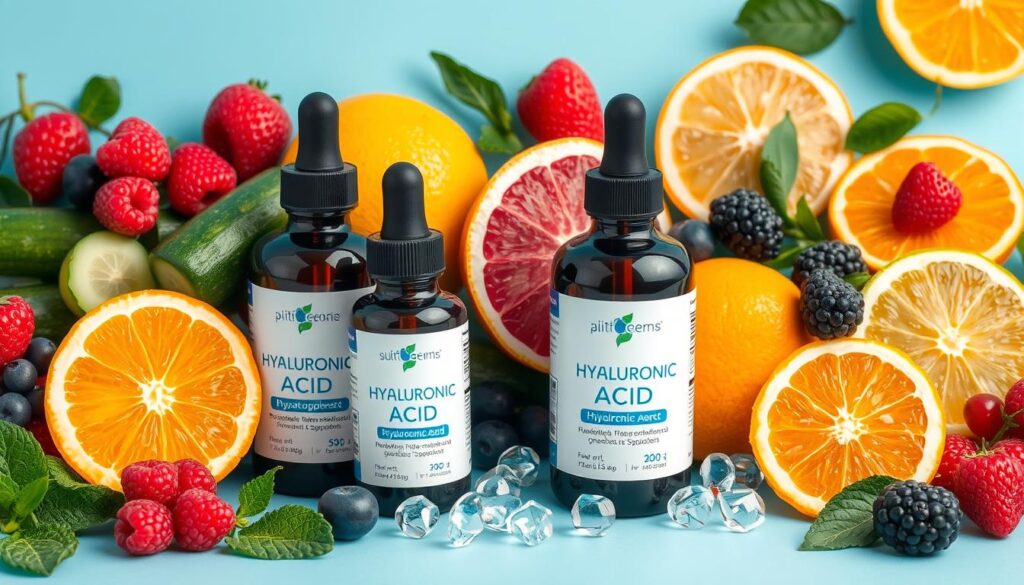Hyaluronic acid supplements are now a big part of health routines. They are great for keeping skin moist and helping joints stay healthy. This substance is found in our skin, connective tissues, and cartilage. It keeps moisture in, which is why it’s so good for fighting aging. Taking hyaluronic acid supplements can boost your health and wellness in many ways.
Key Takeaways
- Hyaluronic acid supplements promote skin hydration and moisture retention.
- They contribute to improved joint health and flexibility.
- This compound is crucial for anti-aging benefits.
- Hyaluronic acid is naturally present in the body.
- Incorporating these supplements can enhance overall wellness.
- Choosing the right supplement is essential for maximum effectiveness.
What is Hyaluronic Acid?
Hyaluronic acid is a key naturally occurring substance in our body. It’s mainly found in connective tissues. This special carb helps keep moisture, making our joints and skin well-hydrated and cushioned.
As our bodies age, we have less hyaluronic acid. This can lead to drier, less elastic skin. It holds water in the body, keeping tissues moist and full.
Hyaluronic acid does more than just hydrate. It repairs and maintains connective tissues. Knowing this shows us how important it is for our health, especially as we get older.
It’s not just great for skin but also for joints. Having enough hyaluronic acid eases discomfort and boosts movement. It’s vital for many body functions.
| Function | Description |
|---|---|
| Hydration | Retains moisture, keeping skin and joints well-hydrated. |
| Cushioning | Acts as a lubricant, providing cushioning for joints during movement. |
| Tissue Repair | Aids in the repair and maintenance of connective tissues. |
The Science Behind Hyaluronic Acid
Hyaluronic acid science gives us incredible insight into its makeup and role. It has special biological properties that let it hold water amazingly well. In fact, hyaluronic acid can keep up to 1,000 times its own weight in water, earning its title as a hydration hero.
The way hyaluronic acid keeps things moist is key for our skin and joints. Whether we put it on our skin or take it orally, it works by pulling in water molecules. This action helps keep our skin flexible and our joints moving smoothly.
Learning about hyaluronic acid’s biological properties helps us understand its many health perks. Naturally found in our bodies, it’s crucial for cell function, healing wounds, and staying hydrated.
| Property | Description |
|---|---|
| Molecular Weight | Varies from low to high, influencing its absorption and effectiveness in different applications. |
| Water Retention | Can hold up to 1,000 times its weight in water, crucial for skin hydration. |
| Elasticity Support | Improves skin elasticity by increasing moisture levels in connective tissues. |
| Joint Lubrication | Acts as a lubricant in joints, reducing friction and inflammation. |
Benefits of Hyaluronic Acid Supplements
Hyaluronic acid supplements come with many advantages. They can boost your health in different ways. By using them daily, you get better skin, healthier joints, and more moisture in your body.
Skin Hydration
Hyaluronic acid supplements are great for your skin. Studies show they can up your skin’s moisture. This makes your skin smoother, less dry, and reduces lines. It helps you look younger.
Joint Health Improvement
Hyaluronic acid is also good for your joints. It works like oil and a cushion, making joints less painful and more flexible. If you have joint problems, these supplements can really help. They are key for joint health.
Moisture Retention for Optimal Health
Keeping moisture in your body is key for staying healthy. Hyaluronic acid helps keep your tissues hydrated. This supports many body functions. It makes hyaluronic acid essential for a health-focused lifestyle.
| Benefit | Description |
|---|---|
| Skin Hydration | Improves moisture levels, reduces dryness, and fine lines. |
| Joint Health | Provides lubrication and cushioning to alleviate pain. |
| Moisture Retention | Supports overall hydration for optimal bodily functions. |
How Hyaluronic Acid Affects Skin Elasticity
Hyaluronic acid is key to keeping skin stretchy by helping make collagen. As we age, our body makes less of it. This leads to more wrinkles and saggy skin.
The effects of hyaluronic acid on skin include holding water and helping collagen fibers stay strong. This makes skin look firm and young. Adding hyaluronic acid can help skin bounce back and smooth out small wrinkles.
Research shows keeping skin moist and boosting collagen can make skin look and feel smoother. More collagen means fewer wrinkles and a glowing face. People using hyaluronic acid often see their skin get more elastic.

The Role of Hyaluronic Acid in Anti-Aging
Hyaluronic acid is known for its strong anti-aging effects. Studies show it helps the skin hold moisture. This leads to younger-looking skin.
Clinical studies show that hyaluronic acid reduces fine lines and wrinkles. It boosts skin moisture, making the skin elastic and smooth. Users find their skin looks fuller and healthier after regular use.
Hyaluronic acid also helps even out skin tone. It supports cell repair and boosts skin health. With daily use, it makes anti-aging skincare more effective.
| Effect | Mechanism | Results |
|---|---|---|
| Moisture Retention | Draws water to skin cells | Plumper, more hydrated skin |
| Reduction of Wrinkles | Improves skin elasticity | Smoother, firmer skin |
| Even Skin Tone | Supports cellular repair | Brighter, more uniform complexion |
Adding hyaluronic acid to your skincare helps fight aging. Its popularity and importance in skincare are growing. It’s key for maintaining youthful skin.
Hyaluronic Acid Supplements and Bioavailability
Understanding how your body takes in hyaluronic acid is key to get the most of supplements. Bioavailability means how well your body can use what you give it. For hyaluronic acid, things like molecular weight and the supplement’s mix matter a lot.
Molecular Weight Considerations
The molecular weight of hyaluronic acid affects how well our bodies absorb it. Studies show that smaller molecules are absorbed better. So, supplements that get this right can improve your skin and joints more.
When picking a hyaluronic acid product, its molecular build is vital for good absorption.
Choosing the Right Supplement
Choosing wisely means looking at several things. Aim for supplements that focus on purity and quality. To find a top hyaluronic acid supplement, here are tips:
- Check for third-party testing to ensure product effectiveness.
- Read customer reviews for insights on absorption and results.
- Consider formulations that pair hyaluronic acid with other beneficial ingredients, like vitamin C.
Vegan Supplements: Hyaluronic Acid Options
Vegan supplements are becoming more popular. People now have plant-based options for natural hyaluronic acid. These products use plants instead of animal ingredients. They are ethical and sustainable choices for those who care about their health and the planet.
Understanding Natural Ingredients
Vegan hyaluronic acid comes from bacteria and plants. It’s made by fermenting these sources or extracting the acid directly from them. This method keeps the product’s purity and offers many benefits for the user.
Benefits of Vegan Hyaluronic Acid
Vegan hyaluronic acid supplements have many good points. They are:
- Ethical sourcing: Made without harming animals, so they’re good for those who care about animals.
- Natural composition: They avoid artificial stuff, which makes them healthier.
- Comparable efficacy: They work just as well as non-vegan types, keeping you hydrated and well.
- Environmentally friendly: Their plant basis means they are better for the Earth.
| Brand | Source of Hyaluronic Acid | Key Benefits |
|---|---|---|
| Vitacost | Bacterial fermentation | Supports skin hydration |
| Nature’s Way | Plant-based extraction | Promotes joint health |
| Garden of Life | Fermented sources | Enhances moisture retention |
Potential Side Effects of Hyaluronic Acid Supplements
Hyaluronic acid supplements are usually safe for many people. However, there are some side effects to know about before you start taking them. Common issues might include bloating or nausea, which are mild.
In rare cases, people might have allergic reactions. These can show up as skin rashes or swelling. It’s important to keep this in mind.
Knowing about supplement safety is key, especially regarding dosages. Taking the right amount can help reduce the chance of bad reactions. If you have allergies or sensitivities, talk to a doctor before you start taking these supplements. This can help prevent any problems.

| Side Effect | Description | Frequency |
|---|---|---|
| Gastrointestinal Discomfort | Symptoms such as bloating, nausea, and upset stomach | Common |
| Allergic Reactions | Skin rashes, swelling, or difficulty breathing | Rare |
| Headaches | Mild headaches experienced by some users | Occasional |
| Injection Site Reactions | In case of injections, localized swelling or redness | Uncommon |
Being aware of hyaluronic acid’s side effects helps in making smart choices. It’s crucial to watch how your body reacts to any new supplement. This helps keep you healthy and safe.
How to Incorporate Hyaluronic Acid Supplements Into Your Diet
Adding hyaluronic acid to your daily routine benefits your skin and joints greatly. To easily add hyaluronic acid supplements to your meals, follow these simple diet tips and intake advice.
When you take your supplements is crucial for the best results. Taking them in the morning with food helps your body absorb them better. Also, staying consistent is key. Try to take your supplements at the same time every day.
Eating foods rich in antioxidants, such as berries and leafy greens, alongside your supplements boosts your health. This combination enhances skin moisture. Foods to pair with hyaluronic acid include:
- Spinach
- Blueberries
- Oranges
- Salmon
- Avocados
Regarding how much to take, most suggest 100 to 200 mg of hyaluronic acid each day. Always read the label or ask a health expert. By following these diet tips, you’ll get the best out of your supplements.
| Supplement Type | Recommended Dosage | Best Time to Take |
|---|---|---|
| Capsules | 100-200 mg daily | With breakfast |
| Powder | 150-300 mg daily | With smoothies |
| Liquid | 1-2 tablespoons daily | With meals |
Comparing Hyaluronic Acid Supplements to Other Options
In the health and wellness world, many are looking for good supplements. They want to improve skin moisture and joint health. Hyaluronic acid stands out for its moisture-holding ability. A comparison of supplements is key in understanding hyaluronic acid against other choices. These include collagen, glucosamine, and omega-3 fatty acids.
Each supplement has its own pros and cons. Here’s a detailed comparison to help make well-informed decisions:
| Supplement | Benefits | Drawbacks |
|---|---|---|
| Hyaluronic Acid | Enhances skin hydration; supports joint lubricity. | May require consistent use for noticeable results. |
| Collagen | Improves skin elasticity; promotes joint strength. | Effects can vary based on source and absorption. |
| Glucosamine | Supports joint health; may alleviate osteoarthritis symptoms. | May cause stomach upset in some users. |
| Omega-3 Fatty Acids | Reduces inflammation; beneficial for heart health. | Not directly related to skin hydration. |
When comparing hyaluronic acid to other supplements, think about your goals. Each has a unique impact on health. So, it’s essential to carefully consider what’s best for you.
Tips for Selecting the Best Hyaluronic Acid Supplement
Finding the right hyaluronic acid supplement can be tough with so many choices out there. But certain tips can make this easier.
First, look for third-party testing. This means an outside company checks the supplement’s quality. Brands like ConsumerLab and Labdoor do these tests. They help you know the product does what it says.
Then, see if the company is open about their ingredients. Good brands tell you where their hyaluronic acid comes from. Knowing this helps you make better choices. Try to pick supplements with studies backing them up. This means they’re more likely to work well.
Thinking about the molecular weight of the hyaluronic acid is important too. Supplements with a lower molecular weight get into your system better. When looking at different options, this can help you decide which one will best help your health needs.
| Factor to Consider | Importance |
|---|---|
| Third-Party Testing | Ensures product quality and safety |
| Ingredient Transparency | Informs about the substance composition |
| Clinically Supported Claims | Validates effectiveness through research |
| Molecular Weight | Affects absorption and bioavailability |
Following these steps makes choosing a hyaluronic acid supplement easier. This way, you can improve your health with the best option for you.
Conclusion
Hyaluronic acid supplements are great for your health and beauty. They help keep your skin moist, improve joint health, and boost your overall wellness. This makes them a key part of staying young and feeling good.
Choosing the right supplement is very important. Not all hyaluronic acid supplements are the same. Pay attention to details like molecular weight and how they’re made. This ensures you get the best results.
Using hyaluronic acid supplements can really make a difference. They can improve how your skin feels and your joint mobility. Remember, they have a lot to offer for your health. So, exploring them can be a good move for your wellbeing.
FAQ
What are hyaluronic acid supplements used for?
Hyaluronic acid supplements help keep your skin moist and joints healthy. They lock in moisture for smoother skin and better joint function.
How does hyaluronic acid support skin hydration?
Hyaluronic acid can hold a lot of water, up to 1,000 times its weight. This keeps your skin plump and lessens fine lines by keeping it hydrated.
Can hyaluronic acid supplements be beneficial for joint health?
Yes, hyaluronic acid is great for joints. It makes them smoother and softer. This can cut down on pain and make moving around easier.
Are there any side effects associated with hyaluronic acid supplements?
Some people might get an upset stomach or allergies from it. Always talk to a doctor before trying new supplements.
What should I look for when selecting a hyaluronic acid supplement?
Choose supplements that your body can easily use. Look at how they’re made, what’s in them, and if science supports their claims.
Are there vegan options for hyaluronic acid supplements?
Yes, you can find vegan hyaluronic acid supplements. They offer the same skin and joint perks without animal ingredients.
How can hyaluronic acid help with anti-aging?
Hyaluronic acid keeps skin elastic and youthful. It helps reduce wrinkles and saggy skin by keeping moisture in.
How do I incorporate hyaluronic acid supplements into my diet?
Start by following the suggested dose and timing. Eating certain foods can boost their impact. A healthcare pro can offer tailored advice.
How does hyaluronic acid compare with other supplements?
Unlike collagen or glucosamine, hyaluronic acid focuses on skin moisture and joint health. The right choice depends on your specific health needs.







